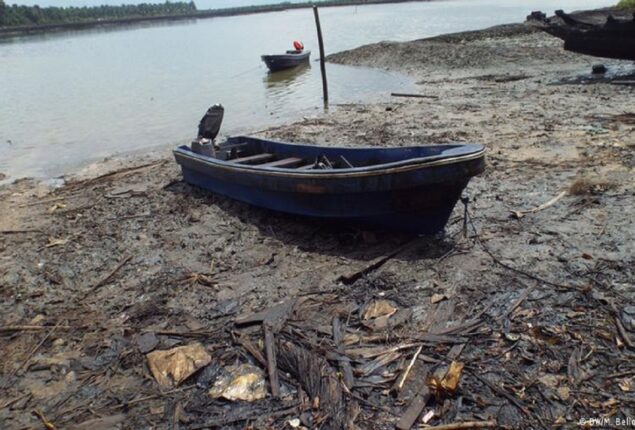UNSG asks Nigeria to examine widespread abortions
Antonio Guterres called on Nigerian authorities to investigate reports of widespread abortions....

Niger Delta criticizes delayed oil spill cleanups
Gbosidan remembers April 12, 2009. Vividly.
Fire from a nearby oil refinery spread to his hometown Deeyor-Kira and damaged his farmlands.
Before the spill, you could plant in four to six months and receive a fair crop, said the 49-year-old father of four. Our livelihoods have been decimated, therefore we live in abysmal poverty. “There’s no purpose in farming if you receive nothing.”
In the mid-1970s, when Gbosidan began farming in Deeyor-Kira in Nigeria‘s oil-rich Rivers State, returns were bountiful and adjacent villages flocked to buy big yams at his village market, he recalled.
Due to the spill and following accidents, he can’t collect enough to meet his family’s needs.
Niger Delta crude oil dominated Nigeria’s export profits for decades. Pollution from periodic oil spills endangers 30 million residents of the region, which encompasses nine states and has 450 km of coastline (280 miles).
The National Oil Leak Detection and Response Agency (NOSDRA) monitors and responds to oil spills in Nigeria.
Between 2011 and 2021, 9,870 spill occurrences spilled 466,214 barrels of oil into the environment.
Researchers from the Swiss Institute for International Economics, University of St Gallen found that 16,000 newborns in the Niger Delta perished in their first month of life in 2012 due to oil spills.
Regional life expectancy is 41, 10 years below the national average.
The 2011 Bonga oil spill from a Shell oilfield harmed 168,000 people in 350 Nigerian towns.
In December 2014, NOSDRA fined Shell $3.6 billion for the 2009 spill at its site. Oil Spill Victims Vanguard (OSPIVV), a local NGO, sued Shell three years later to clean up the damaged environment and compensate 168,000 people and towns.
Aloysius Okerieke, OSPIVV’s general manager, told Al Jazeera the case is ongoing.
Ogoniland, 261 communities in four Rivers State LGAs, is 1,000 sq km (385sq miles). It’s the pollution epicenter.
Between 1976 and 1991, 2,976 oil leaks poisoned the area, according to Friends of the Earth International.
Analysts claim oil corporations’ poorly maintained pipelines ruined this oil-rich region.
Emmanuel Obemeata, an environmental health specialist and senior lecturer at the University of Port Harcourt, said the Ogoni crisis began with faulty, old, exposed pipelines. Every corporation must maintain pipelines and do environmental surveys every five years. If these corporations don’t perform, you can expect this.”
Repeated oil spills prompted a UNEP environmental study (UNEP). The 2011 assessment detected widespread soil and groundwater contamination and suggested a substantial clean-up.
Five years later, the cleaning was inaugurated in Bodo, Ogoniland, with Vice President Yemi Osinbajo and then-environment minister Amina Mohammed.
Osinbajo, who began the clean-up, said restoring Ogoniland’s ecology will take 25 to 30 years and that the “clean-up process will provide jobs for young people.”
Nigeria’s oil industry is 60 years old. Oil has boosted Nigeria’s economy but harmed the Niger Delta ecology. Fishing and farming are suffering, he said.
The government agency supervising the procedure, the Hydrocarbon Pollution Remediation Project (HYPREP), began preliminary remediation in 2018.
So far, 50 site lots have been granted in a $1bn process. Experts argued HYPREP broke the guidelines and said it was badly done.
Local paper Premium Times found that businesses without remediation experience were awarded Ogoni clean-up contracts. One lot went to a livestock company, and another to a finance and development firm.
Obemeata: “The cleanup hasn’t followed UNEP recommendations.” We won’t make progress unless the current leadership takes this seriously and avoids politicizing the process.
Saatah Nubari, head of Niger Delta Congress, told Al Jazeera that the entire cleanup will be questioned.
UNEP also suggested clean water for Ogoniland because many water sources were contaminated.
Charles Oyibo, an environmental expert at Niger Delta University, warned Al Jazeera this might harm locals’ health.
“The [effect] keeps stacking up until they get exacerbated and manifest as health concerns like cancer,” he said.
Nyiedha Nasikpo, 59, the former king of the Bomu village, said, “We drink from [polluted] streams.”
Oyibo said the cleanup process is plagued with holes and requires expertise from many fields, not only HYPREP.
“HYPREP isn’t a cleanup company. It should be a regulating agency, he argued. “Cleanup is a multidimensional operation that requires medical professionals and agronomists because water bodies, vegetation, and soil will be remediated.”
Al Jazeera didn’t hear back from HYPREP.
Gbosidan in Deeyor-Kira has given up.
People have endured untold suffering. We’re broke and sick. Without money, you perish.
He wants the Nigerian government to visit and see for themselves.
Catch all the World News, Breaking News Event and Latest News Updates on The BOL News
Download The BOL News App to get the Daily News Update & Follow us on Google News.